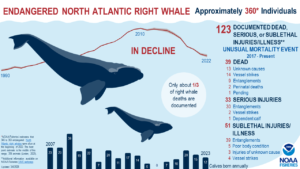It was disappointing to the see the Richmond Times-Dispatch stoop to a weak ad hominem argument on its front page on May 6, seeking to discredit a legal challenge to the Dominion Energy Virginia wind project by labeling the plaintiffs as “climate deniers” and defenders of tobacco.
The challenge to the federal permits for the wind project is based on some of the same laws and precedents used to challenge (and successfully delay) the Mountain Valley Pipeline in Southwest Virginia. The Biden Administration is pushing construction of thousands of ocean wind turbines in the migratory path of an endangered whale species. The Endangered Species Act requires their careful protection and lawsuits are filed under its provisions all the time.
Yet the first thing reporter David Ress and his editors thought it important to mention was that the plaintiffs “challenge Biden administration climate policy as climate change alarmism.” Deeper into the story he details some of their skeptical statements on the issue, and in the case of one group even brings up statements about tobacco.
Of what possible relevance to turbine permitting are The Heartland Institute’s views on tobacco regulation? Oh, I guess if Heartland is not convinced tobacco kills people, that would explain why it is also not convinced the climate catastrophe is killing people. The problem is that a quick visit to Heartland’s website reveals it does consider smoking a health hazard and it is pushing non-tobacco vape alternatives as providing “harm reduction.” So, it recognizes harm after all.
There is some actual news about the lawsuit, which Ress all but ignored, but which explains why the newspaper chose now to attack the plaintiffs. A federal judge in Washington has taken up the plaintiffs’ request for an injunction, with some deadlines for information and briefs building up to a key hearing later this week. Reports that she ruled for the plaintiffs were premature, but she also didn’t rule for the company or the Biden Administration.
A fair hearing and a chance to force the permit granters to defend their decisions constitutes a victory for Heartland and the other two activist groups who brought the case. A full scale injunction may follow. Then again, it may not. Wait and see.
Unfortunately, as was pointed out earlier, the financial blow from any delays may fall on Dominion’s ratepayers. That was mentioned previously here and fleshed out in a column for the Thomas Jefferson Institute. This is another aspect of the story the newspaper ignored, preferring paragraphs like this one:
The National Legal and Policy Center “contends that climate alarmism has become exaggerated and increased greenhouse gases will be far less damaging than often claimed,” while the Committee for a Constructive Tomorrow website says: “It’s time to CANCEL Earth Day!”
Again, how does that address the question of whether mitigation plans to protect the whales are sufficient? One thing the judge has asked for is proof those plans were even fully approved in the first place, obviously needed before construction begins.
The Jefferson Institute has been coordinating with the groups behind the lawsuit, especially the Committee for a Constructive Tomorrow (CFACT.org). The Jefferson Institute very much shares the skepticism about some looming climate crisis. Assuming for argument’s sake there is one, the $10 billion wind project would remain a boondoggle that doesn’t move the needle on greenhouse gas emissions but merely impoverishes utility customers.
The reliance of Europe on offshore wind has exploded energy costs in many of those countries, especially Germany, and Governor Glenn Youngkin has been recruiting jobs for Virginia based on our lower energy costs. This pending Dominion project and the planned second phase will bring that advantage to an end one day.
Rising costs have scuttled three more wind construction proposals in New York. Dominion’s first phase locked in costs with suppliers well before the inflation crisis now gripping the industry, but so far, the utility has revealed no hard cost projection for its second phase.
One of the key arguments that the environmental and biological impact reviews on the wind plan have been inadequate is focused on the overall, cumulative impact of all the various projects up and down the coast. Won’t it be ironic if that concern disappears because Dominion’s turns out to be the only major project ever built?




